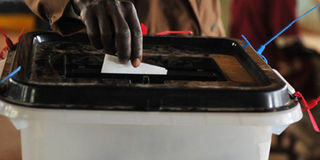Coalition rows could result in snap election

The IIEC has a register of 12.4 million voters but must undertake new registration because there are now more than an estimated 20 million eligible voters, including about nine million youth who have not registered and two million Kenyans abroad. Photo/FILE
The persistent wrangles in the coalition government have sparked debate about the possibility of a snap election, raising the question whether the country is prepared for early elections when Parliament has yet to pass new electoral laws.
The new Constitution requires that the new electoral laws be in place within the next seven months, failing which any person can petition the High Court on the matter.
In such an eventuality, the Chief Justice may ask the President to dissolve Parliament to pave way for elections in 60 days.
An early poll would also mean that the country would be forced to hold yet another election in less than a year because the Constitution says the first elections for 47 county assemblies and governors shall be held during the 2012 General Election.
Although politicians have promised to give priority to passing election laws, including one that would lead to the establishment of a permanent electoral body, little has been done.
The Interim Independent Electoral Commission (IIEC) says it would be prepared for a snap poll but warns such an occurrence would lock out as many as 10 million Kenyans who qualify to vote.
Eligible voters
The IIEC has a register of 12.4 million voters but must undertake new registration because there are now more than an estimated 20 million eligible voters, including about nine million youth who have not registered and two million Kenyans abroad.
“If there were to be a snap election, then it means that only those who have registered could vote, as the law gives the commission only three months to prepare and hold the elections,” IIEC chairman Issack Hassan told the Sunday Nation in an interview.
The commission will also have to undertake a massive registration of voters once the new constituency boundaries have been determined.
Those previously registered will be able to transfer their voting residence to their preferred constituency. But he did say the IIEC had the technical and operational capacity to conduct the 2012 elections.
“There are, however, issues that are beyond the commission’s control, such as the enabling legislation and the requisite financial resources, which are dependent on Parliament and Treasury respectively.
“We have been liaising with them and other relevant agencies, and they have assured us of their commitment to the process,” Mr Hassan said.
His sentiments were echoed by Justice and Constitutional Affairs minister Mutula Kilonzo who said that with the current electoral laws, the country faces a very difficult task if there were a need to go for a snap election.
He also expressed concern that MPs might not be willing to enact the new election laws and the new electoral body.
“Some Parliamentarians might oppose bills which seem to stand in the way of their favourite candidates getting into power and vice-versa,” Mr Kilonzo said.
Due to the large number of votes expected to be cast in the next election, including those from new constituencies, the election budget is set to increase drastically.
Legal frameworks
The legal frameworks that have to be put in place include those for national, parliamentary and county electoral governance, the registration of voters outside the country and the establishment of the Independent Electoral and Boundaries Commission (IEBC).
Laws on political parties and electoral disputes also have to be passed. The IEBC is also critical to the creation of the 80 new constituencies that must be in place before the next elections.
But Mr Hassan said the biggest challenge is that many of the anticipated reforms depend on the yet-to-be-enacted legislation.
He said that although his commission was just transitional, it was going ahead with plans to conduct the next General Election, whether in 2012 or earlier.
“We have prepared a strategy to guide us from 2011 to 2017. There is also the Election Bill that introduces various reforms in elections. We will need these new laws in place to strengthen the electoral system and processes,” he said.
The IIEC is a caretaker electoral body with nine commissioners that was set up after the discredited Electoral Commission of Kenya was disbanded in 2008 after the bungled 2007 presidential poll.
Kriegler Commission
The Kriegler Commission concluded that due to widespread and systematic incompetence throughout Kenya’s electoral system, it was impossible to know who won the 2007 presidential election.
Mr Hassan said that although the IIEC had successfully tested the electronic voter registration system, automated voting was still under study.
On e-voting, Mr Hassan said factors such as infrastructural capacity of the country, security of the system, the requisite legal framework and the buy-in from all stakeholders must first be considered.
The IIEC is also putting in place strategies that will aid the registration of Kenyans abroad according to Article 82(1)(e) of the Constitution.
But because there is still no legal framework on how this is to be done, the IIEC cannot begin to register new voters.




